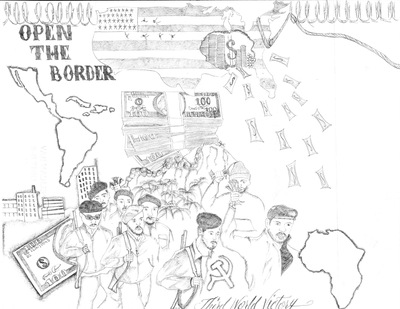
Georgia Probationers Are No Third World Workers
A popular story in the bourgeois press this week gave an interesting side-by-side comparison of the lumpen in the United $tates to the Third World proletariat. The story came on the heels of new repressive practices targeting Latinos in the state of Georgia with immigration laws beginning July 1 of this year. For fear of deportation and imprisonment, both of which restrict their ability to work, migrant labor crews made up of Mexicans and Guatemalans are steering clear of Georgia. As a result fruit is rotting in the fields.(1) The story exposes the extreme parasitism of this country that cannot even harvest its own food. Amerikans are so rich and spoiled that the labor market cannot fill jobs paying above minimum wage if the work is too hard. If the labor market were free and open the jobs would fill up instantly, but Amerikans oppose this vehemently as they cannot maintain exploiter-level incomes without closed borders. In these times of economic crisis many of these parasites would have you believe that they are “struggling to put food on the table.” As they let food literally rot in the fields, we see that just is not true.
To solve the relative labor shortage, the governor of Georgia turned to the population that sits somewhere between the foreign-born and the Amerikan in terms of citizenship rights – prisoners and the formerly incarcerated. Generally defined as the permanently unemployed, excluded from what Marxism calls the “relations of production,” the lumpen class includes most prisoners by definition. There is a degree of continuity between the lumpen on the street and the imprisoned lumpen, but many get out of prison to join the petty bourgeois class that dominates this country.
One article cites the Georgia Department of Corrections as claiming that unemployment for all probationers in the state is only 15%, but the Governor’s office reports that it is 25%.(2) While much higher than the overall rate of 10% in Georgia, this is still lower than most estimates for young Black male unemployment, and therefore suspiciously low considering that most job applications in the United $tates require you to declare whether you have been imprisoned or convicted of a felony, and this information is used against the applicant. Just looking at the 25% number might suggest that 75% of Georgia probationers have a greater continuity with the (employed) petty bourgeoisie than with a lumpen underclass. Yet recidivism rates in this country over 50% indicate that many of the alleged 75% with jobs will not be staying in the workforce for long. The majority of parolees will not remain in the workforce, but will cycle in and out of jail, prison, rehab, hustling and short-term employment.
While many former prisoners of the United $tates will never live the Amerikan dream, their ideology reflects that culture more than that of the working people of the world. One farmer in Georgia did a side-by-side comparison with a crew of probationers and a crew of migrant laborers and the migrants picked almost 6 times as many cucumbers.(1) Apparently the probationers didn’t even bring gloves, and we assume most had no experience with this type of work, so there was certainly room for improvement. But the whole crew didn’t even last a full day before quitting. The reports are vague about how many probationers actually lasted more than one day of work, but it was evidently a minority in this small sample.
In response to recruitment efforts for these jobs among U.$. citizens, one Black womyn in Georgia was reported to say, “The only people that would even think about doing that are people who have nothing else left… An educated black person does not have time for that. They didn’t go to school to work on a farm, and they’re not going to do it.”(3) We call those “who have nothing else left” the proletariat, and those who “[don’t] have time [for hard work]” a parasitic class living off the labor of the proletariat. By virtue of living in the United $tates alone, even the lumpen have access to many resources through the highly developed infrastructure in this country: welfare programs, religious and charity organizations, and just living off of the excess and waste of the general population. Overall they are not driven to take the hardest jobs, and U.$. capitalists must look to the Third World for labor, even for production that is tied to U.$. soil and therefore pays exploiter-level wages. (Legally the jobs start at the minimum wage of $7.25, while piecework incentives allow the fastest pickers to make $20 an hour at one cucumber farm.(1) Of course, when only migrants without papers are working and the press isn’t around it is common for agricultural work to pay well below the legal minimum wage.)
During the Great Proletarian Cultural Revolution (GPCR), in a country where a professor or shop owner was far poorer than the unemployed Amerikan, the Chinese had to actively combat the type of thinking epitomized in the petty-bourgeois womyn quoted above. Millions of petty-bourgeois Chinese went to the countryside to work and be re-educated. Many youth went happily, excited about building a new China, while many cried the whole time and went on to write books about it to explain to Amerikans why the GPCR was so horrible.
There are righteous reasons why a population of unemployed Blacks would be resistant to working at hard, lower-paying jobs while Amerikans around them are making much more for sitting around in air conditioning pushing paper, and we don’t expect that to change under capitalism. That is why all U.$ citizens will require re-education to become productive members of society, from the poorest lumpen who despises working for the white man to the richest CEO whose income could support a large village.









